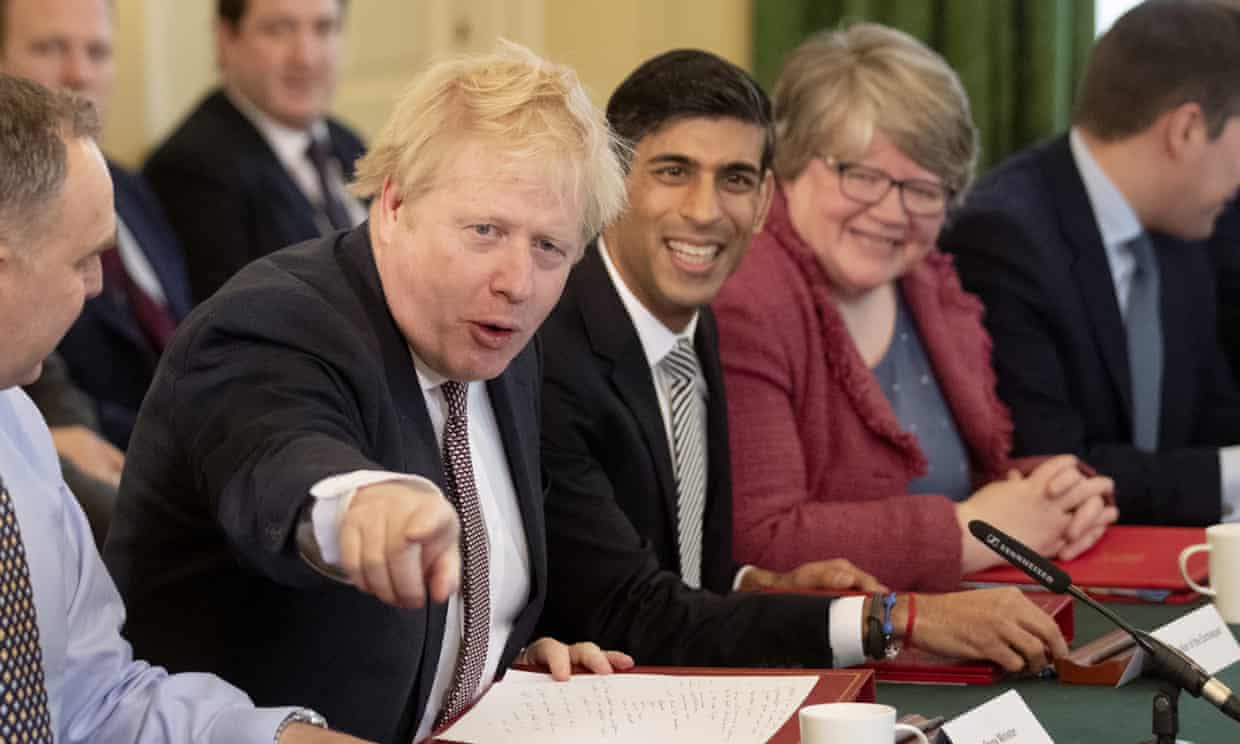
Immigration and asylum
Rishi Sunak could be more relaxed on public spending, hints No 10
Newly-appointed chancellor could be given room to manoeuvre with deadline extension
by Heather StewartDowning Street has appeared to hint that newly-appointed chancellor, Rishi Sunak, could adopt a more relaxed approach to public spending than his predecessor.
Sajid Javid resigned on Thursday with a parting shot at the prime minister about ensuring the Treasury retains its independence – but Boris Johnson is impatient to turn on the spending taps.
Javid promised during the general election campaign to balance the books on day-to-day spending over the next three years; but no timescale was included in the Conservative manifesto – and Johnson’s key adviser, Dominic Cummings, is known to be wary of allowing tax-and-spending rules to dictate policy.
Sunak spent two-and-a-half hours with officials on Friday, including advisers from No 10 who will lead the new joint No 10-Treasury unit rejected by Javid. Downing Street was unable to say whether the budget will go ahead as planned on 11 March.
And asked whether the government would stick with Javid’s spending rules, which could tie No 10’s hands as it seeks to “level up” the country, a spokesperson said: “We will continue to have a clear fiscal framework,” and repeatedly referred to the party’s election pledges.
Government sources stressed that Sunak was a “fiscal hawk” – committed to spending restraint. But one proposal believed to be under consideration is extending the deadline for balancing the books, perhaps to five years. That could create more leeway for upfront spending on what Johnson refers to as the “people’s priorities”, including hiring more police and nurses.
At the start of Friday morning’s cabinet meeting – which was recorded for television, Johnson led his new slimmed-down team, which he called the “people’s government” – and reiterated his election pledges.
After the cameras left the cabinet agreed that a tougher immigration system would be introduced at the start of next year.
Details of the scheme will not be announced until next week, but a spokesman for Johnson confirmed that it would close down routes for low-skilled workers to come to the UK, with the effect of reducing overall immigration.
“Following discussion, cabinet agreed the implementation of a points-based immigration from 1 January 2021. The system will be simpler and fairer, and will not discriminate between countries – and will return democratic control of immigration to the British people,” a spokesperson said.
“The prime minister stressed that we must demonstrate that the UK is open and welcoming to talent from across the world; but the new system would end reliance on importing cheap, low-skilled labour – bringing down migration numbers overall.”
That will mark a dramatic change, fulfilling one of the central promises of the Vote Leave campaign during the Brexit referendum.
Successive Conservative governments had promised to reduce migration, but lacked the ability to control the number of EU arrivals. Concerns about the impact on economic growth and public services limited the extent to which ministers were prepared to crack down on non-EU arrivals.
Asked exactly how the new system would cut immigration, the spokesman said: “We will introduce a points-based system which by its very nature will give the government control over who can come in. You have the levers within the system.”
Asked if the government would be willing to accept slower economic growth as the price of bringing migration down, he said: “The prime minister has been clear: the public elected this government on the basis of taking back control of our borders. That is what this policy will do.”
Sunak sat alongside the prime minister as the cabinet met. Downing Street said Sunak had reminded ministers of their need to find savings of 5% from their departmental budgets, to be “reprioritised” for other purposes.
Johnson continued to fill the lower ranks of his government on Friday with several new appointments. Greg Hands, who resigned rather than vote for Heathrow expansion, returns as a minister in the department for international trade.
Jake Berry, a longtime ally of Johnson’s, resigned as Northern Powerhouse minister, rather than accept a job in another department. The transport secretary, Grant Shapps, will now take control of the project.
Several women were also appointed to junior roles. The government insisted Johnson was committed to advancing female talent despite the fact that fewer than a quarter of his new cabinet are women.